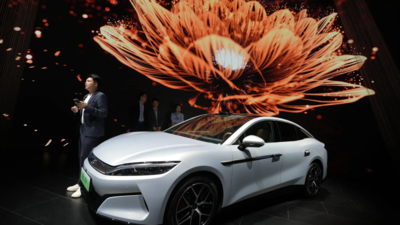
China targets involution’ in EV market (Image credits: AP)
China’s government is stepping in to cool down the fierce price war in its electric vehicle (EV) market, as concerns over oversupply, shrinking margins, and industry instability grow.After years of aggressive industrial policy driving EV adoption, China's electric vehicle market has become the largest in the world. But it now hosts more automakers than the market can sustain, prompting fears of a bubble and unprofitable competition, reported AP.Market leader BYD reported strong sales growth, a 31% jump in the first half of the year to 2.1 million vehicles, but the company’s aggressive pricing strategy has drawn criticism.
Nearly half of those sales were pure electric vehicles, with the rest being plug-in hybrids. BYD stopped selling internal combustion engine cars in 2022.On May 23, BYD slashed prices across more than 20 models, setting off a fresh round of EV price cuts in China. That same day, Great Wall Motors Chairman Wei Jianjun warned of unhealthy market dynamics, comparing the situation to the downfall of real estate giant Evergrande.
. “The Evergrande in the automobile industry already exists, but it is just yet to explode,” he said.BYD quickly responded, rejecting the comparison. Brand executive Li Yunfei defended the company in a strongly worded social media post, calling the remarks “confusing” and “ridiculous.”
China moves to stop ‘involution’
Following the dispute, China’s Ministry of Industry and Information Technology vowed to address what it called “involution” competition, referring to destructive, zero-sum market behavior.
Meanwhile, the China Association of Automobile Manufacturers urged fair competition, noting that drastic price cuts had sparked panic across the industry.“That price cut might have been the final straw that irked both competitors and regulators for the ruthlessness that BYD continues to show,” said independent analyst Lei Xing.In June, 17 Chinese automakers, including BYD, pledged to pay suppliers within 60 days, marking a significant shift.
Many EV companies have been stretching out payments or issuing IOUs to suppliers — a risky practice that mirrors tactics used by developers like Evergrande before the real estate crash.Will EV demand hold as prices stabilise?Analysts say these government efforts, along with cutbacks on financing deals and warnings against predatory pricing, are meant to stabilize the market and support long-term growth.With overseas sales rising, BYD exported 464,000 vehicles in the first half of 2025, and global tariffs increasing, China’s EV industry faces a turning point at home and abroad.

 4 hours ago
1
4 hours ago
1







 English (US) ·
English (US) ·